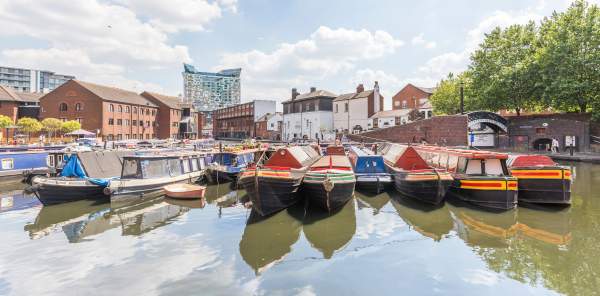Impact of Climate Change on the West Midlands
Where we are now?
Efforts to reduce greenhouse gas emissions are in place to address the causes of climate change, and there are many ways businesses can contribute towards this as indicated on the Training and Resources pages. However, at present, the global pace of emissions reduction is not rapid enough to prevent climate change from impacting society, including our economy and infrastructure. Therefore, we all need to be prepared for the impacts of climate change in the West Midlands.
Evidence shows that we have already experienced many impacts from extreme weather events. This has included:
- Flooding, either from water courses (fluvial flooding) or directly from intense rainfall events (flash flooding).
- Storms, where a mix of strong winds and heavy rain leads to disruption and damage to infrastructure and buildings.
- Extreme heatwaves, such as the July 2022 event which broke UK temperature records.
- Droughts, as a consequence of drier summers, leading to hosepipe bans.
Some of these events have had devastating impacts on people’s ability to go about their daily activities. Experience in the West Midlands and across England has shown that extreme weather could have some serious consequences to your own business operations, and also for businesses in your supply chains.
Where we are heading?
There is increasing evidence that extreme weather events are increasing in frequency and intensity. In the second half of the century, the amount of change that occurs will depend on how successful we are in reducing greenhouse gas emissions globally. This will influence the extent to which we need to adapt and, therefore, how significant the impact will be on businesses and the tourism sector.
This table shows what the expected changes are likely to be against a best (rapid global reduction in emissions) and worst (slow reduction in emissions) case scenario.
Although some of the projected changes in the above table may seem modest, even in the best-case scenario, they could lead to profound effects on our climate and, therefore, lead to impacts that could affect your business. Some of the potential impacts and consequences in the West Midlands are likely to be as summarised in the table below.
|
Likely trend |
Impact |
Potential consequence |
|
Reduction in rainfall in summer |
Drought |
|
|
Increase in rainfall in winter |
Flooding |
|
|
Increase in temperature in summer |
Heatwaves |
|
Potential impacts on the West Midlands tourism industry
The impacts of climate change on the tourism sector are wide-ranging and could be both positive and negative, with the positive impacts only likely to be realised if the negative ones are addressed. More information on this can be found on the Adaptation and Resilience pages. Impacts on tourism are also not hugely well defined, but some possible examples include the following:
|
Positive |
Negative |
|
|
All of the above may have economic impacts on your tourism business, both positive and negative; your business should take action to ensure it is prepared for the changes that it may experience.
Further resources
A Summary of Climate Change Impacts in the West Midlands Combined Authority Area (2022)
Climate Change: Implications for tourism (2014)
Climate risks to the cultural heritage sector (2021)
Weathering the Storm – A Guide for Tourism Businesses (2014)
Weathering the Storm – Saving and Making Money in a Changing Climate (2022)
